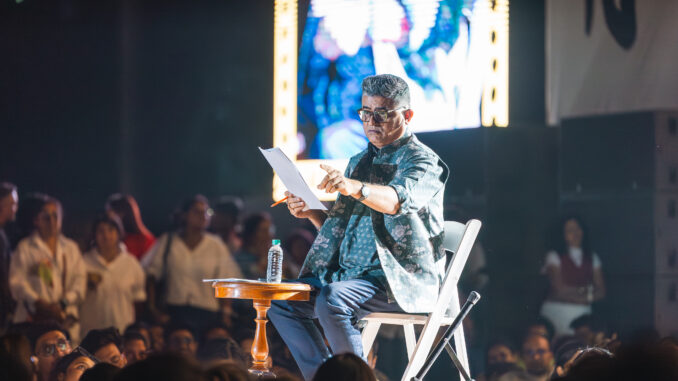 On the Mehfil stage at the Spoken Fest, Mumbai, the Badhaai Ho fame Gajraj Rao presented a thought-provoking and witty tale in his signature humorous style. It captured the unspoken struggles of chasing an unconventional dream in a world that values security over passion. The seasoned actor, who has carved a niche with his nuanced roles, delivered his story filled with raw emotion with a personal reflection on societal expectations and generational shifts. His words echoed a poignant truth about how the very phrases “Log Kya Kahenge”/ “Koi ladki nahi dega” that once shaped his own choices have now shaped his children’s paths.
On the Mehfil stage at the Spoken Fest, Mumbai, the Badhaai Ho fame Gajraj Rao presented a thought-provoking and witty tale in his signature humorous style. It captured the unspoken struggles of chasing an unconventional dream in a world that values security over passion. The seasoned actor, who has carved a niche with his nuanced roles, delivered his story filled with raw emotion with a personal reflection on societal expectations and generational shifts. His words echoed a poignant truth about how the very phrases “Log Kya Kahenge”/ “Koi ladki nahi dega” that once shaped his own choices have now shaped his children’s paths.
Gajraj Rao took the audience back to 1989, painting a picture of a home where television and Doordarshan were the only source of entertainment, and stability was the ultimate goal. His father, like many of those times, believed in traditional success—secure jobs, government postings, and a steady pay check. They would often argue, with his father taunting him about being a theatre artist, insisting that destiny wouldn’t unlock with the stage but with a stable job—one that offered security, not uncertainty. But Gajraj had different dreams, ones that didn’t fit within the confines of a stable career. “Acting ki gaadi nahi chali toh patri change kar dunga, writer ban jaunga”, he would tell himself. (Translation: If the acting career doesn’t take off, I’ll switch tracks and become a writer.)
He hilariously recounted the taunts that once shaped his journey, the weight of expectations pressing down on him. “If you are so good for nothing, then log kya kahenge? Koi ladki nahi dega!” he mimicked his father, leaving the audience nodding and giggling in recognition. (Translation: If you are so good for nothing, what will people say? No one will give you a girl). However, these words weren’t just his father’s—they echoed through neighbours’ unsolicited advice and relatives’ knowing glances.
His immense love for cricket, especially watching Test matches with his friend, was yet another source of criticism. With a playful eye-roll, he recalled his father’s exasperated remarks: “Cricket ka itna shauk tha toh khel lete, sports quota mein admission mil jaata”.
(Translation: If you were so fond of cricket, you should have played—it could have gotten your admission through the sports quota.)
“Government job hone se future safe ho jaata hai, acting hobby ke liye theek hai”, said a relative, reinforcing the belief that stability was the only respectable path, while dreams like his were nothing more than fleeting indulgences. (Translation: A government job secures your future; acting is fine as a hobby.)
“What will people say? What will society say? These are the questions I’ve tried to solve since childhood”, he admitted with a smirk. While his friends followed conventional paths, securing stable jobs and structured lives, he was constantly reminded of what he lacked—certainty, predictability, and in their eyes, a respectable future. Compared to the sons of his father’s friends, cousins and relatives who studied hard and built steady careers, he was the outlier, the one who hadn’t ‘figured it out’.
But despite the doubt, Gajraj held his ground. And then, validation came unexpectedly—from an NRI relative who, unlike the others, expressed genuine excitement upon learning that Gajraj was pursuing dramatics. “Your son will be the first in our family to earn fame through the arts. You are very lucky”, he told Gajraj’s father, a sentiment that shifted the entire narrative at home. For the first time, his father, who had always dismissed the profession, seemed to see it in a new light. That single moment of support planted the idea that perhaps dramatics could be a real career choice.
Theatre was his calling, even if it meant enduring scepticism, struggling through rejections, and walking an uncertain road. The climb was slow, riddled with self-doubt, yet he pressed on, proving that passion could be a pursuit, not just a pastime.
And then, the irony. The same people who once warned him that “no girl would marry an actor” now proudly pointed at the screen when he appeared. The whispers of doubt had turned into murmurs of admiration. Society, once his biggest critic, had rewritten its own rules—because success, as it turns out, isn’t measured by stability. It’s measured by conviction.
Gajraj’s story wasn’t just about defying expectations; it was about rewriting them. And in doing so, he left the audience with a question of their own—what if we stopped asking, log kya kahenge?
With his effortless charm, storytelling prowess, and a lot of humour, Gajraj took the attendees through a journey of self-reflection and familial bonds, making them question not just the world around them, but also the world within. Each word resonated deeply, as the lines between personal experiences and universal truths blurred.
The atmosphere of Spoken Fest’s seventh edition was palpable. Building on the tradition of the previous six editions, the audience in Mumbai has strongly connected with the spirit of the festival. Spoken Fest once again became a sanctuary for those seeking deeper connections through words, drawing a community of listeners eager to experience the art of storytelling, poetry, and music from India’s most cherished voices.

